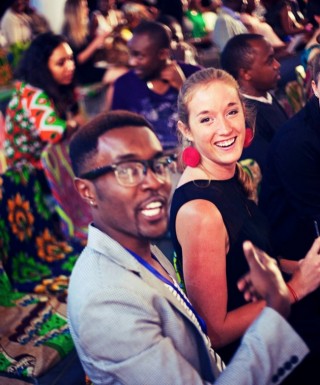 The past two months have flown by here. I originally planned to come here to independently research Kenya’s microfinance landscape—seeking to understand how Kenyans, both in rural areas and in the slums of Nairobi, use rotating savings and credits associations (ROSCAs) and accumulating savings and credit associations (ASCAs) to manage their finances— rather than the MFIs in the country.
The past two months have flown by here. I originally planned to come here to independently research Kenya’s microfinance landscape—seeking to understand how Kenyans, both in rural areas and in the slums of Nairobi, use rotating savings and credits associations (ROSCAs) and accumulating savings and credit associations (ASCAs) to manage their finances— rather than the MFIs in the country.
But then while co-oping in China and thinking about my experiences at Grameen Bank in Bangladesh, I decided I wanted to learn more about approaches to income development beyond increasing access to financial resources.
Alas, I have spent the past two months visiting the offices of companies in the private sector, NGOs and nonprofits, government ministries, and attending conferences on agricultural development, mobile health, and IT and innovation. I was welcomed to join DEMO Africa’s team to help throw their first conference last week, where 40 start ups from across Africa (including Senegal, Cameroon, South Africa, Ghana and Kenya) pitched new products for web or mobile platforms—nearly half of which were social enterprises. DEMO Africa is an initiative between Microsoft, Nokia, USAID, and the US Department of State to create a launch pad and supportive environment for African start-ups.
In terms of meetings, I’ve met frequently with Acumen Fund, and am holding early stage meetings with organizations to determine if they fit their investment criteria, and in the process am learning more about the fund’s investment strategy. I’ve realized it’s actually extremely difficult to find organizations that have proof of concept, potential to impact at least 50,000 people, sound management, and financial feasibility to undertake roughly half a million dollars in investment. There are incredible ideas and people in every corner of the country; and yet many are still the seed of any idea.
Kenya, also does not seem to be lacking for financing, but coordination. There seems to be funds for every individual cause or focus, from healthcare to agriculture, to microfinance, but also variation in terms of target amounts. Bridge funds are popping up to acknowledge the funding gap between a company’s start-up phase and SMEs targeted by larger funds such as Acumen. The Savannah Fund is a new exciting player on the scene, and has been founded by an incredible team of Kenyans and partnerships with Silicon Valley.
I’ve met with Savannah Fund, OpenCapital, DEMO Africa, TechnoServe, Grameen Foundation, mSurvey, iHub and Nailab (two of the nearly 20 different accelerators/spaces for young IT developers in Nairobi), Tropical Fresh (a fair trade vegetable exporter who recently received an investment from Root Capital), PAWA254 (a creative space for media, developers and activists to collaborate), the Ministry of Agriculture and the Ministry of Cooperatives—to name a few. I was also able to attend the government’s Agricultural Sector Development Forum where 1,000 government officials met to establish the country’s new agribusiness strategy.
TechnoServe has been one of the most engaging companies, and has welcomed my role as a student and desire to learn more about enhancing market access for smallholder farmers, and mobilizing farmers into groups whereby they can earn substantially more when they bring their crops to the market. I have met with one of their previous successful projects, the Sabasaba Agribusiness Society, that bulks bananas from farmers in the central province, and connects them with markets in Nairobi. Their Chairmen has incredible ambition and dedication to the cooperative, and has plans to establish value-addition at the cooperative and begin processing jams, flours, wines and other banana byproducts. TechnoServe has also shared their business training curriculum, and invited me to go with them to the Tana River (an area currently battling local conflicts) to observe their early stage farmer mobilization for a new program to connect mango farmers to larger urban markets.
Tropical Fresh is founded by the son of a farmer, whose dedication to helping smallholder farmers, I believe, has become one of the central pillars of the company’s potential. I’ve just recently joined their team in order to help them locate the necessary partnerships within Kenya to increase the number of cooperatives they work with in the countryside, and connect them to the myriad of financial institutions in the city that correlate with the company’ s vision and capital needs. Founded in 2009, they are working to certify small-scale farmers under FairTrade and Global Gap—which can cost up to 400,000 shillings a year, per cooperative.
Engaging with Tropical Fresh and TechnoServe has shown me that success for smallholder farmers depends on largely two things: 1. farmer initiative and 2. patient capital. There are a lot of upfront costs in establishing a new agricultural program, ranging from machinery for value-addition facilities, to inputs such as fertilizers and seeds, technical assistance to guide new farming practices, irrigation to transition from rain-fed agriculture, certification to maintain the standards necessary for many urban and international markets, infrastructure development, transportation, refrigeration and storage facilities, and THEN throw in the need for agricultural financial products for the individual farmer. It’s expensive, and seemingly not an appealing area of development right now, despite farmers comprising the majority of the world’s poor, and rising demand for food.
However, even if these costs are covered, a strong program thoroughly researched and implemented, TechnoServe has explained that it will ultimately fail unless it has buy-in from the farmers—something that after decades of disheartenment, failed investments and desire to move away from farming, is difficult to cultivate.
Ultimately, the biggest lesson I have learned so far is that microfinance needs to better reach smallholder farmers. There’s an investment bubble building in Nairobi, especially in ICT and start-ups, and the youth are more excited about trying to become the next M-Pesa rather than start an agribusiness.


